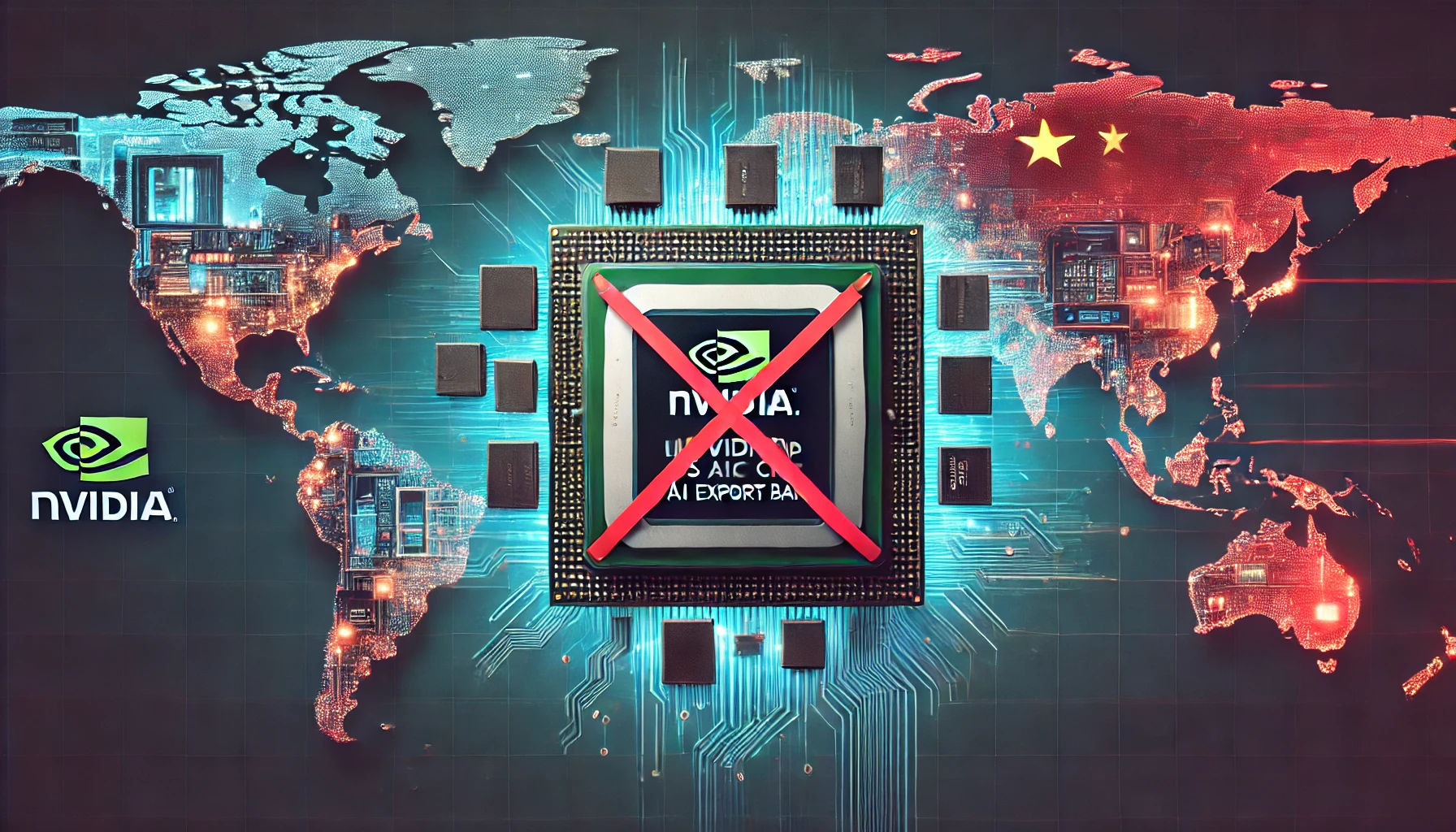The Potential Impact of a US AI Chip Export Ban on Nvidia, AMD, and Global Markets
The United States is reportedly considering capping the export of AI chips from tech giants Nvidia and AMD to certain countries, sparking widespread discussion about the potential impacts on the global technology landscape. With the rising demand for advanced AI processors, this move could significantly reshape the industry and exacerbate existing US-China tech tensions. As both Nvidia and AMD dominate the market for AI chips, restricting their exports will have far-reaching implications for global markets, international relations, and the future of AI development.
In this blog, we’ll explore the details of the AI chip export ban, how it could affect Nvidia and AMD, and what it means for the broader tech ecosystem. We’ll also examine the geopolitical factors driving the US export controls and discuss how this development could influence global competition in the AI race.
AI Chip Export Ban: What’s at Stake?
The potential AI chip export ban primarily targets AI processors and high-performance chips that power data centers, autonomous vehicles, and cutting-edge technologies like machine learning and deep learning. By limiting access to these chips, the United States aims to maintain its technological edge while curbing the capabilities of adversarial countries in sensitive areas.
Why the US is Considering an AI Chip Export Ban
The primary motivation behind the US AI chip export ban is to prevent foreign powers—particularly China—from gaining access to the sophisticated hardware needed to drive advancements in artificial intelligence. AI is not just a technological innovation; it plays a critical role in economic, military, and strategic domains. As the competition between the US and China intensifies, controlling the flow of AI technology is becoming increasingly crucial.
The US government has already implemented export controls on other forms of technology, but extending these restrictions to AI chips represents a significant escalation. Such a move would have a profound effect on both Nvidia and AMD, as these companies are key players in the global AI chip market.
Nvidia AI Chips: Leading the Market
Nvidia is widely regarded as the dominant force in the AI chip market. Its graphics processing units (GPUs) have been adapted to perform highly parallelized tasks, making them ideal for AI computations, machine learning models, and data processing. The company’s cutting-edge AI chips are used in everything from research labs to autonomous vehicles, and the demand for these chips continues to grow.
How a Ban Could Affect Nvidia
If the US enforces a Nvidia export ban, it could severely limit the company’s ability to sell its AI chips to key markets, particularly in countries like China that represent significant revenue streams for Nvidia. China is a major consumer of Nvidia’s AI technology, and an export restriction could lead to:
- Revenue Losses: Nvidia could experience a considerable drop in sales, given that China accounts for a large share of its AI chip business. This would not only affect the company’s bottom line but also ripple through its supply chain.
- Supply Chain Disruptions: Nvidia relies on a global network to manufacture and distribute its chips. An AI chip export ban could complicate this process, leading to logistical challenges and production delays.
- Loss of Competitive Edge: If Nvidia is restricted from accessing certain markets, competitors—especially Chinese chipmakers—could fill the gap, weakening Nvidia’s dominance in the AI chip space.
In the context of an AI chip export ban, Nvidia AI chips will likely become a central point of contention between the US and countries seeking access to cutting-edge AI technology.
AMD AI Chips: Another Key Player
While Nvidia may dominate the AI chip market, AMD has been gaining ground as a formidable competitor. AMD has developed AI chips that are increasingly used in high-performance computing, cloud services, and data centers, putting it in direct competition with Nvidia. Like Nvidia, AMD also stands to be impacted by the potential export restrictions.
The Impact of an AMD Export Ban
For AMD, an export ban would have similar repercussions:
- Revenue Impacts: Although Nvidia leads the AI chip sector, AMD has carved out a growing share of the market. A restriction on AI chip exports would limit its access to foreign markets and potentially slow down its growth trajectory in regions where demand for AI chips is high.
- Loss of Global Market Share: By restricting exports, AMD risks losing its position in a highly competitive market, allowing non-US competitors to step in and capture market share. Chinese companies, in particular, could benefit from such a vacuum, potentially accelerating the development of homegrown AI chip technology.
- Research and Development Slowdown: Both Nvidia and AMD invest heavily in R&D to stay ahead of the curve. Losing access to lucrative markets could reduce the funds available for further innovation, weakening their leadership in AI chip development.
The US government’s decision on whether to implement an AMD export ban will thus play a crucial role in shaping the company’s future, as well as the global AI landscape.
US Export Controls: A Geopolitical Strategy
The possible US AI chip export ban is not just about technology; it’s also a geopolitical strategy aimed at curbing the rise of rival powers. The United States has increasingly used export controls to maintain its technological leadership while preventing the transfer of critical technology to countries deemed national security threats.
AI Chip Restrictions: A Broader View
The potential restrictions on AI chip exports are part of a larger trend where the US is tightening control over high-tech products. Previously, the US imposed restrictions on exports of semiconductors, 5G technology, and even certain software, all designed to maintain a strategic advantage in fields critical to national security.
In the case of AI chip restrictions, the aim is to limit the ability of countries like China to develop advanced AI systems that could be used in military applications, surveillance technologies, or strategic planning. This aligns with the broader US policy of decoupling from China in sectors deemed vital to national security.
The Role of US-China Tech Tensions
US-China tech tensions are central to this issue. Over the past few years, tensions between the two countries have escalated, particularly in the technology sector. The race for AI dominance is just one of many battlegrounds in this larger conflict, with each side seeking to outpace the other in terms of innovation, development, and deployment.
By enforcing AI chip export restrictions, the US government could not only limit China’s access to cutting-edge AI technologies but also send a strong signal that the US is prepared to use its technological assets as leverage in broader trade and diplomatic negotiations.
What’s Next for Nvidia, AMD, and the Global Tech Ecosystem?
If the US moves forward with the AI chip export ban, the effects will be felt not only by Nvidia and AMD but also across the entire global tech ecosystem. The ban could:
- Shift Global Supply Chains: Countries impacted by the export ban may look to develop alternative suppliers or boost domestic AI chip production capabilities, reshaping global supply chains.
- Accelerate Tech Decoupling: A full-fledged export ban would likely accelerate the decoupling of the US and China in the tech sector, further isolating Chinese companies from accessing Western technologies.
- Spur Innovation in AI Chip Alternatives: Faced with the prospect of losing access to Nvidia AI chips and AMD AI chips, countries like China may invest heavily in developing their own AI chip technology, potentially creating new competitors in the market.
For the broader AI industry, these developments will lead to a more fragmented market, with different regions relying on distinct suppliers for AI hardware. This fragmentation could slow down global collaboration and reduce the interoperability of AI systems across borders.
The Future of AI Chip Exports and Global Competition
As the United States weighs the option of capping exports of AI chips from Nvidia and AMD, the stakes are higher than ever. An AI chip export ban would not only have significant economic and technological implications for these companies but also contribute to rising US-China tech tensions and alter the landscape of global AI development.
In the short term, Nvidia and AMD may face revenue losses and market share declines, while their competitors, particularly in China, could seize the opportunity to develop alternative solutions. However, the long-term effects of these restrictions will depend on how quickly other countries can adapt and innovate in the absence of access to leading US AI chips.
For those interested in understanding the broader geopolitical and technological trends shaping the future of AI, it’s important to stay informed about these developments. For more insights into global technology trends and export controls, visit Regent Studies, where you can find in-depth analysis and expert perspectives.



